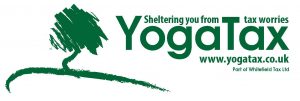 Its Self Assessment Season for Yoga Teachers with 2017-18 returns being due in by 31 January 2019, with tax due on that date as well.
Its Self Assessment Season for Yoga Teachers with 2017-18 returns being due in by 31 January 2019, with tax due on that date as well.
In this post YogaTax MD Jessica Garbett, also a Yoga Teacher, covers a few FAQs and hot issues.
First Off, What Period Does This Cover?
The return due in by 31 January 2019 is for the year 6 April 2017 to 5 April 2018 – however its generally OK to do your business accounts for the 12 months to 31 March to save faffing around with the odd week.
Do I Need To Do A Return?
You will need to do a return if
- you have untaxed income – for most people reading this, it will be Self Employment – but untaxed income could be rents received, investment income over thresholds (see below) or a capital gain; or
- HMRC have sent you a return (in other words you can’t ignore it even if there is nothing to declare); or
you need to declare High Income Child Benefit Charge (if you’ve claimed Child Benefit and you or your partner have an income of over £50,000
If all your income is taxed at source, eg under PAYE, then you don’t need to do a return unless HMRC send you one.
Investment income. Dividends need to be declared if they are more than £2,000. Bank Interest needs to be declared if more than £1,000 (£500 if you are a 40% tax payer, £0 if you are a 45% tax payer)
What Needs To Go On The Return?
You need to declare:
- Profits from Self Employment
- Wages / Salary from employments/jobs, even though tax is deducted under PAYE
- Rent received
- Income from investments and savings (Dividends and Bank Interest) – but not from ISAs
- Capital Gains – unless exempt, eg Selling your own home
Are There Any Exemptions?
There is one useful exemption, the so called Trading Allowance. This works in one of two ways:
- Firstly, if your gross income from Self Employment is less than £1,000 – that’s before expenses are taken off – then you don’t need to declare it. In practice this means if you haven’t registered as Self Employed then you don’t need to, and unless there is other untaxed income, you don’t need to submit a return; if you are registered as Self Employed and are sent a return then just enter Self Employment as zeros.
- Secondly, if your income from Self Employment is over £1,000, you need to register and submit a return, but you can claim a fixed £1,000 of expenses even if your expenses total less than this. This relief is open to every self employed person, regardless of how long you’ve been trading, so it’s a useful relief if you don’t spend a lot on running your business.
There is a similar relief – Property Income Allowance – for rental income. Same figures and mechanics of operation.
I Need To Submit A Return But I’m Not Registered / I Have Lost My Passwords
If you are not registered Self Employed then you should have done so by 5 October 2018, but the good news is HMRC don’t normally penalise you if you get your return in by 31 January. So first thing is to register as Self Employed with HMRC and get your tax reference which will be a ten digit number, called a UTR (Unique Taxpayer Reference).
Once you have a UTR you will need to create an online account with HMRC, and allow some time for this as passwords are normally sent by post.
What if you are registered but have lost your login details? Well you will need to contact HMRC for new ones, which will come out by post.
Bottom line, if you need to register / get a new password, do this now, don’t leave it till the last week of January. In the meantime work on getting your income and expenses up together.
If you use an accountant to file for you, they don’t need your logins, just the UTR as they force file with professional software.
I Haven’t A Clue How To Complete My Return
Firstly, breathe. Secondly, we have a “zero to hero” filing your own return guide:
Filing Your Own Self Assessment Return
You can, of course, use an accountant to help you, and we would charge £200+vat for a simple return, but that doesn’t bypass the need to get your expenses and income up together.
Again, start early – leaving this to the end of January runs the risk of rushing, making mistakes, missing things.
Business Expenses Always Confuse Me, I Haven’t A Clue What I Can Claim
Well, funnily enough we have a guide on this:
What Expenses Can I Claim Against Tax
Hot issues around expenses include:
- Clothing – a real grey area
- Training costs – you can’t claim your initial trainings, but you can claim CPDs and add ons
- Travel costs – HMRC say you can’t claim regular journeys
What Happens If I Miss The 31 January Deadline
If your return doesn’t go in on time then there is an initial £100 penalty. After three months it becomes £10 a day on top of the initial £100.
You also get charged interest on the tax due.
I’ve Submitted My Return But The Tax Is More Than I Thought It Would Be And I Can’t Pay It.
You need to speak to HMRC about this and agree a payment plan. Contact them as soon as possible.
Why Are HMRC Charging Me For This Years Tax As Well As Last Years. How Do They Know What I Will Earn This Year?
The tax you pay on 31 January 2019 is for 17-18, so it goes back to a period starting 21 months ago.
To ensure Government receives tax more or less in line with when profits are earned, if your tax bill for last year, 17-18, is more than £1,000 then they ask you for a 50% payment on account for this year, 18-19.
Eg – if your tax bill for 17-18 due on 31 January 2019 is £1,800 then they will ask for £900 on 31 January 2019 – making your total payment £2,700 on 31 January 2019. You will be asked for another £900 on 31 July 2019. When you come to pay 18-19 taxes in January 2020 the £1,800 in advance is taken off.
There is no estimating involved, the formula is laid out in law. However if you know this years tax bill will be lower for some reason then you can apply to reduce your payment on account. Do this via your HMRC account, or with form SA303. If you think this years tax will be higher, you don’t need to notify that – just be prepared to pay the extra next January.
Voluntary Class 2 NI
Class 2 NI on Self Employed Income is due at £2.95 per week if your business profits are over £6,025.
If your profits are below that level then you can tick a box on your return to pay voluntary Class 2 NI. This is worth doing if you don’t pay NI elsewhere – eg via an employment – or get an NI credit, eg because you are claiming Child Benefit. Although it costs you £150 for a years voluntary NI, it gives you a year of State Pension entitlement and it’s a lot cheaper than Voluntary Class 3 NI which is £14.65 a week for broadly the same benefit.
Self Employed people also pay Class 4 NI at 9% on profits over £8,424. Classes 2 and 4 NI are applied jointly, hence the different thresholds.
If you claim Child Benefit then you get a form of NI credit, but note you must claim Child Benefit even if your eligible amount is £0 as you or your partner has income over £50,000 pa.
My Head Hurts – How Can I Get Help?
Well, an accountant can help with advising you on what is necessary, and filing your return, although you will have to provide them with the raw information of course.
YogaTax specialise in Yoga Teachers, Yoga Studios and other Mind Body Therapies. A basic tax return starts at £200+vat.
Read About our Fees and Services
Our website has a wealth of help sheets which are free to access – 60 at the last count and growing – and we are happy to help out with the odd email if you are navigating filing by yourself
Bottom line, 31 January looms, and its best to get an early start rather than avoid a last minute rush, possible mistakes, and a shock of a tax bill


